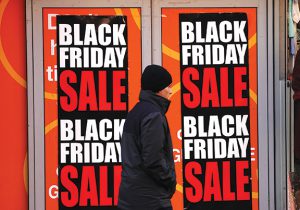Bloomberg
A lackluster Black Friday in the UK added to an already muted Christmas season, leaving retailers with a problem: too much stock.
Marks & Spencer Group Plc, Next Plc and Hotel Chocolat Group Plc are all trying to tackle high inventories that are forcing some British retailers to take on costly warehouse expenses and contemplate even steeper discounts. According to data firm Springboard, footfall on Black Friday was 17% lower than
pre-pandemic levels, indicating “consistent nervousness around spending in the current climate.â€
The problem has been building for months, as many stores ordered their winter stock at the start of the year, when supply-chain problems still meant long waiting times and before spiraling inflation began to hurt spending. At the same time, consumers are sending back significantly more products than November last year, compounding the inventory problem, according to ReBound, a firm that manages returns for retailers.
“Retailers heading into Black Friday were sitting on more stock than they traditionally would at this time of year,†said Miles Lethbridge, director in deals strategy and operations at PwC. “Combine that with some retailers maybe having a slower Black Friday than they anticipated and that means there is a lot of stuff bunging up certain retailers’ supply chains.â€
Marks & Spencer has asked suppliers to postpone deliveries to its warehouses and has delayed finalising orders for next year, the Sunday Times reported.
The food and clothing chain said it’s having to “readjust stock flow,†like other retailers, as
lead times normalise after the pandemic. British chocolatier Hotel Chocolat is seeking to “materially reduce†its inventory levels with stock taking on average 5.5 months to sell through
versus 3.5 months before the pandemic.
Next has denied some requests for warehouse space from smaller commission label brands because the retailer already has enough inventory. It’s a contrast to last year when “no one had any stock†and there was very little discounting, Next Chief Executive Officer Simon Wolfson has said.
A build-up of stock is particularly hard for fast-fashion chains to manage as items can fall out of style quickly and miss their season. Asos Plc had £1.08 billion ($1.3 billion) of unsold stock in August, up 34% from a year earlier. The online retailer is writing off more than £100 million of product.
Excess stock means that retailers face a tough path during the key Christmas trading period. The unusual winter timing of the 2022 World Cup is also disrupting commerce, and British brands are having to
contend with postal strikes by the Royal Mail, making it harder to send stock out and manage returns.
“The level of discounts and volume of products discounted is higher than usual,†said Nabil Malouli, vice president in global e-commerce for DHL.
 The Gulf Time Newspaper One of the finest business newspapers in the UAE brought to you by our professional writers and editors.
The Gulf Time Newspaper One of the finest business newspapers in the UAE brought to you by our professional writers and editors.
